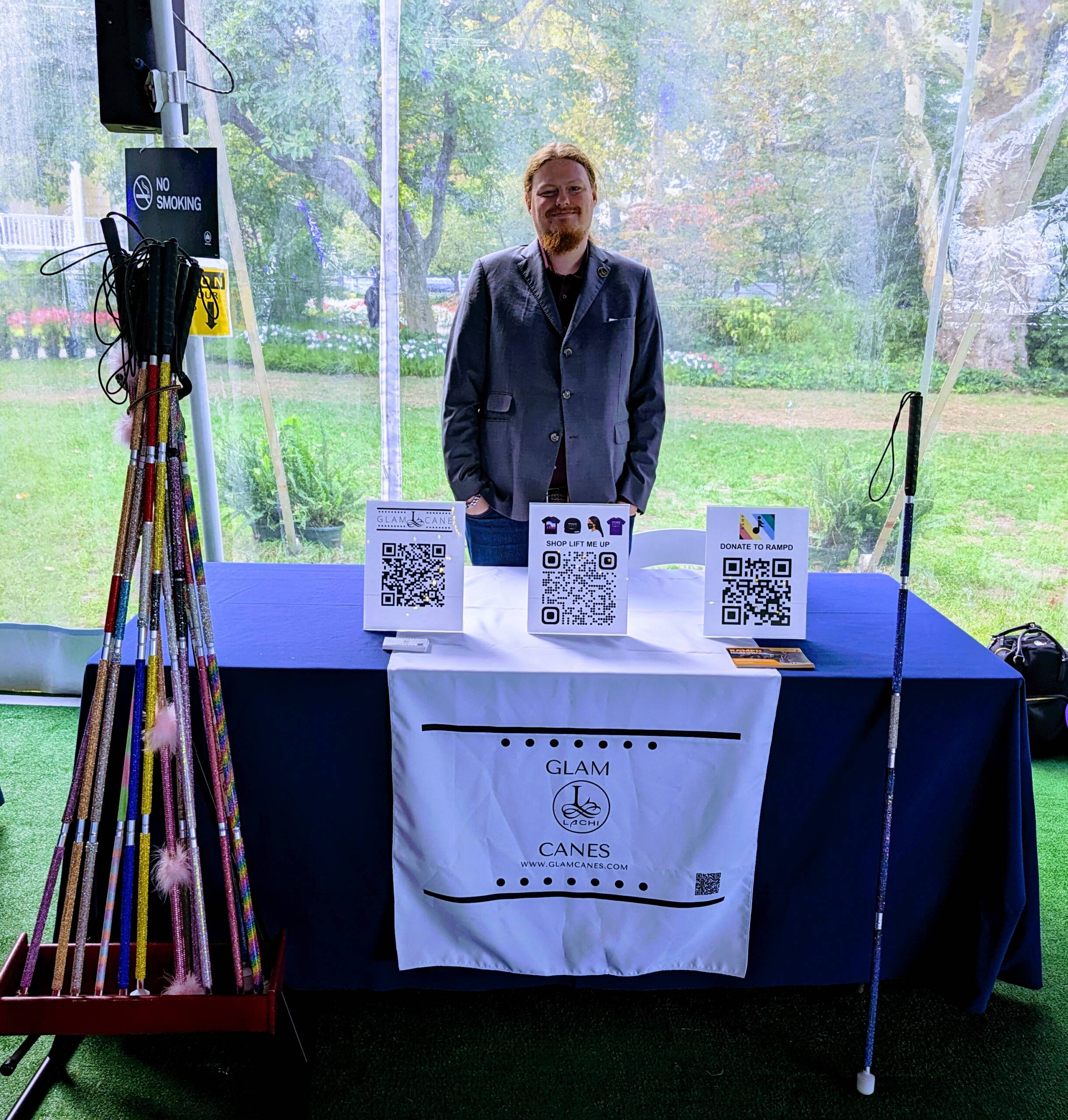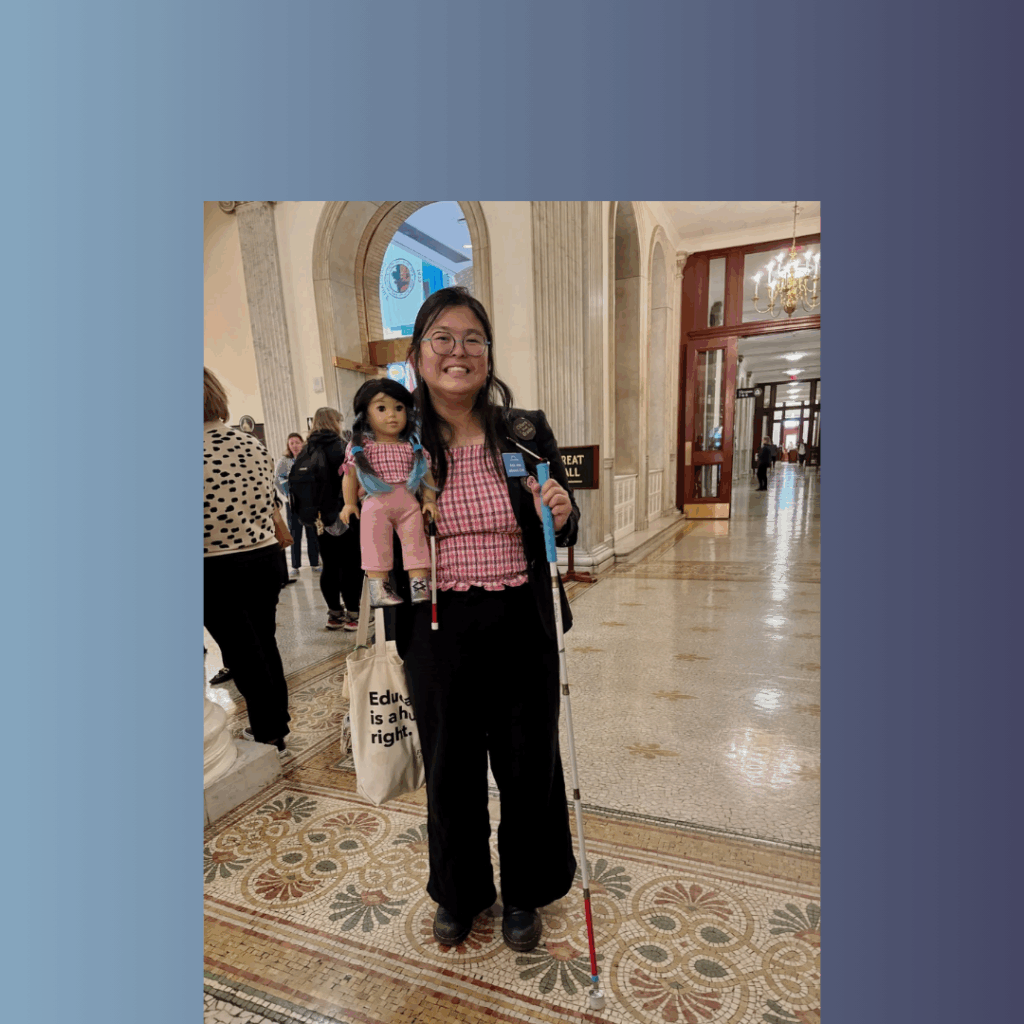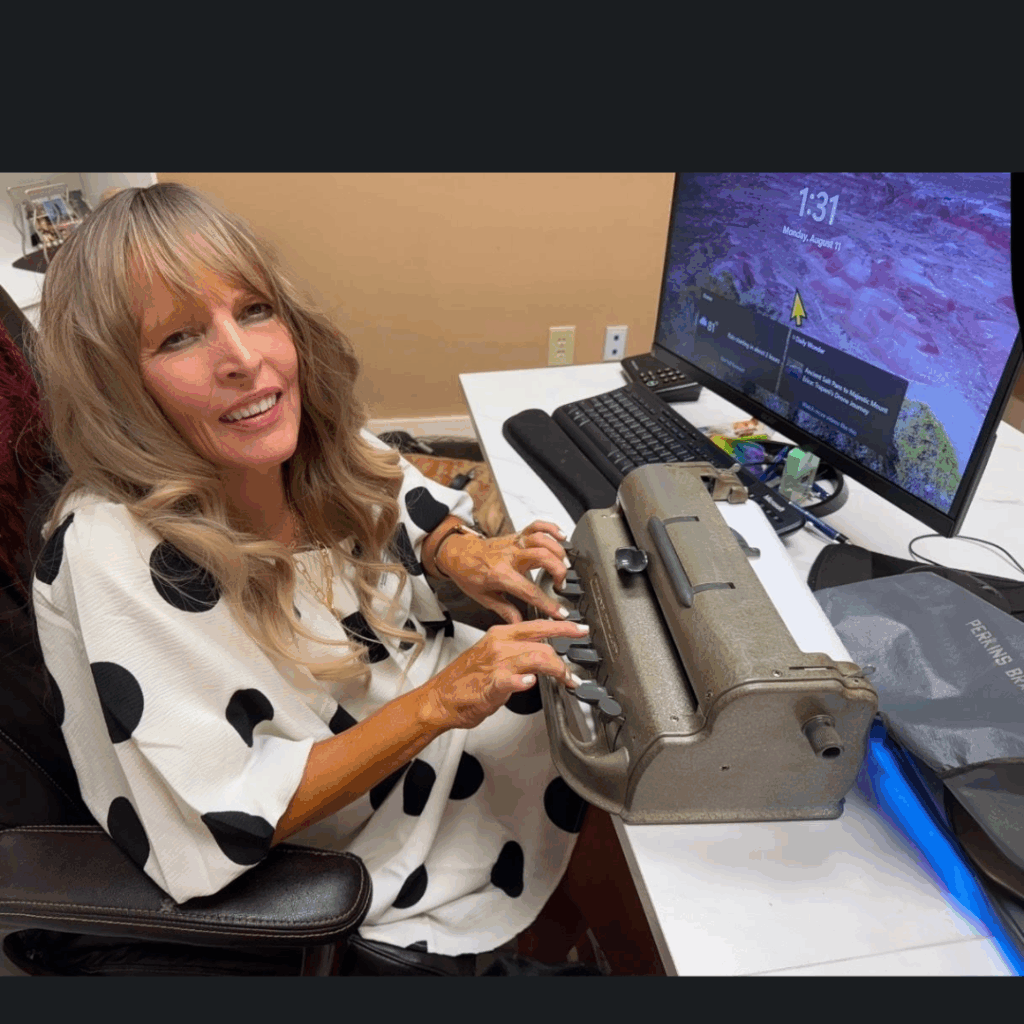I’m the founder of Glam Canes – white canes that are bejeweled with rhinestones (currently through an individually hand-crafted process) and made to not only be fashionable but functional. They are iridescent, giving off a sheen of sophistication, while being easily discernible as a blindness signifier.
As manager and sighted companion to legally blind recording artist and personality Lachi, I’ve been to some of the coolest, most exclusive music industry parties and galas. And I’ve noticed that not only is Lachi the most fashionable one there, but everyone comes over from far and wide to say hello to her.
But I’ve worked with her for several years and I remember a time when that wasn’t the case, where she would show up to gatherings and be a wallflower. She hadn’t wanted to use her cane for fear of the stigma, but not doing so kept her from being able to navigate confidently or to signal to people why she didn’t acknowledge their waving.
Glam Canes shimmers to life
Once Lachi began using her white cane, she got better at navigating the studio and asking for accommodations that allowed her to perform better. In turn, she got even better gigs.
As she rose through the ranks and started working with major artists, she began getting invited to the bigwig galas. With her newfound confidence, she needed a cane that would match her personality and the gowns she was wearing.
I was already becoming her stylist, makeup artist and jack of all trades, so I began bejeweling her canes – and Glam Canes were born.
Celebrating blindness instead of erasing it
We see stories of this all the time on social media and Reddit posing questions like, “What if people think I’m too blind to hire?” or “…think I need help when I don’t?” or even “…think I’m not blind enough and accuse me of faking?”
This fear of judgment keeps a large contingent of legally blind and low vision people who have been prescribed to use a cane from using it. This also keeps the cane hidden from society, which helps perpetuate those misunderstandings and stigmas.
As a person who is neurodivergent, I’ve found that the hardest part of navigating disability is not the disability itself, but all the energy spent on the social barriers, and most importantly, the internalized ableism.
So Glam Canes works to replace erasure with celebration by turning the symbol of blindness into a fashion statement.
Fashion is a form of self-expression – and just because someone is blind doesn’t mean they can’t be fashionable.
We’re not selling canes, we’re promoting confidence. We’re starting conversations. We’re breaking stigmas. We want to export that same feeling of pride, confidence and glamor that Lachi came to find, to every blind and low-vision fashionista out there – to be able to add that layer of “because I believe I’m worth it” to the conversation while walking down the street or into any room, without having to say a word.
Glam Canes in the wild
From Molly Burke (video) to Lucy Edwards and Haben Girma, Swifties and Barbz, Grammy and Oscar nominees, folks going on first dates, out to graduations, or just to work or school, people have been making statements with their Glam Canes around the world.
We’ve spotted Glam Canes on magazine covers and red carpets, and Lachi has had the honor of taking her Glam Canes to the White House (video). Everyone comes back with the same experience: feeling confident, elegant, and most importantly, seen.
And we’re still just getting started. Soon we’ll be adding accessories, merch, and expanding to walkers, mobility canes, and anywhere else the DisCo (disability community) can benefit from a little bit of sparkle and confidence!
About Glam Canes
Lachi probably does the best job describing the Glam Canes mission so I’ll close with how she put it during an interview: “One of the things that makes my heart smile is to see young women and men with their blinged out cane on a date – at a Taylor Swift concert, at a Beyonce concert – walking around feeling glamorous and gorgeous and wanting to be seen. For so long people who are blind or partially blind try to get around without using a cane because of the stigma. I’m here to turn that stigma on its head… It’s all about that confidence, It’s all about being able to say, ‘You know what, I am blind, I am sexy, I got money, I am competitive. Look. At. Me.’ That’s what this says.”
To learn more about Glam Canes, visit their website or follow them on Instagram.
About the author
Arthur Gwynne heads operations for the award-winning platform RAMPD (Recording Artists and Music Professionals with Disabilities) where he’s collaborated with the likes of Netflix and the Recording Academy to build inclusive programming. Arthur also manages the career of globally touring recording artist, charting songwriter and cultural activist Lachi, the go-to voice on Disability Culture in the music industry.
Throughout the course of this mission-work, Arthur stepped away from a career in executive recruitment, and opened up publicly about his own neurodiversity. Today Arthur runs a robust diverse team, booking national tours, negotiating major contracts, working everything from creative projects and music releases to development programs.
Arthur speaks on panels and podcasts – at places like the Kennedy Center and the Music Managers Forum – on how embracing one’s neurodivergence is an asset in the music industry. He has also made it his mission to break down the silos and barriers holding back the disability community, laying seeds for a national conversation on Disability Culture and what Inclusion and Universal Accessible Design means at a practical and industrial level.
Beyond all of this, Arthur is Lachi’s stylist, and designs her iconic Glam Canes.
About Lachi
Lachi is a globally touring recording artist, award winning social entrepreneur, GRAMMYs Chapter Board Governor, and host of PBS’ American Masters series “Renegades.” Born legally blind, she uses her platform in music, storytelling and fashion to amplify identity pride and Disability Culture. Her U.N.-recognized organization RAMPD has collaborated on disability-inclusive solutions with the GRAMMYs, Netflix, Tidal, SONY Pictures Entertainment and more.
Her recent song Lift Me Up, a homage to Judy Heumann, peaked at #29 on U.S. Adult Contemporary radio, with airplay on MTV.com and BETSoul. Named a USA Today Woman of the Year, a “new champion in advocacy” by Billboard, and “a foot soldier for Disability Pride” by Forbes, her cultural activism has landed her spots on national ads and TEDx stages, discussions with the White House, BBC, Good Morning America and the New York Times, and her bejeweled glam canes have popped up everywhere from New York Fashion Week to major LA movie premieres.
Lachi’s “Out of the Dark” – out now! – (video) is a haunting jazzy track that celebrates being ”out” and loud about who you are. The song also features Trans activist Medusa, queer influencer Spencer West, Grammy award-winning instrumentalists, and the cover art was made by the multifaceted TT the Artist. It is the first video in Lachi’s MAD DIFFERENT project, a high-production content series of four acoustic concerts and accompanying interviews, which features Lachi in collaboration with notable co-artists and thought leaders intersecting with various Counter-Cultures.
You can read more from Lachi in her previous #MyBlindStory posts, Say It Loud! I’m Blind and I’m Proud and Unafraid: How I Overcame the Ultimate Fear.



